
CHAPTER VI
1. Mencius said to the king Hsüan of Ch'î, 'Suppose that one of your Majesty's ministers were to entrust his wife and children to the care of his friend, while he himself went into Ch'û to travel, and that, on his return, he should find that the friend had let his wife and children suffer from cold and hunger;—how ought he to deal with him?' The king said, 'He should cast him off.'
2. Mencius proceeded, 'Suppose that the chief criminal judge could not regulate the officers underhim, how would you deal with him?' The king said,'Dismiss him.'
3. Mencius again said, 'If within the four borders ofyour kingdom there is not good government, what is to be done?'


He removed from Pin to Ch'î, as is celebrated in the ode, Shih-ching, III. i. Ode III. st. 2. 古公=先公, 'the ancient duke', T'an-fû's title, before it was changed into 大王, 'the king, or sovereign, T'âi'.
CHAPTER 6. BRINGING MORE HIS BAD GOVERNMENT TO THE KING OF CH'Ȋ.
1. 之楚, —之 is the verb=往. 比, in 4th tone,=及, as in Analects, XI. xxv. 4, 5. 冻 and 馁=active, hiphil verbs. It is better to prefix 'suppose that', or 'if', to the whole sentence, in the translation, as the cases in the remaining paragraph cannot well be put directly, as this might be. The replies suggest the renderings of 如之何, which I have given.
2. 士师, see on Analects, XVIII. ii. 治 is the 2nd tone.In the next paragraph, it is the 4th. The two instances well illustrate the difference of signification, which the tone makes.


The king looked to the right and left, and spoke of other matters.